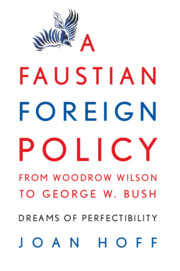Book contents
- Frontmatter
- Contents
- Introduction: Toward a Faustian Diplomacy
- 1 The United States Forms and Refines Its Diplomacy
- 2 The Faustian Impact of World War I on U.S. Diplomacy
- 3 The Faustian Aspects of Prosperity, Depression, and War
- 4 Faustian Aspects of U.S. Cold War Foreign Policy
- 5 Cold War Transformation of the American Presidency
- 6 The United States Adrift in the Post–Cold War World
- 7 Flaunting Faustian Foreign Policy
- Epilogue: The Legacy of George W. Bush
- Notes
- Bibliography
- Index
3 - The Faustian Aspects of Prosperity, Depression, and War
Published online by Cambridge University Press: 18 August 2009
- Frontmatter
- Contents
- Introduction: Toward a Faustian Diplomacy
- 1 The United States Forms and Refines Its Diplomacy
- 2 The Faustian Impact of World War I on U.S. Diplomacy
- 3 The Faustian Aspects of Prosperity, Depression, and War
- 4 Faustian Aspects of U.S. Cold War Foreign Policy
- 5 Cold War Transformation of the American Presidency
- 6 The United States Adrift in the Post–Cold War World
- 7 Flaunting Faustian Foreign Policy
- Epilogue: The Legacy of George W. Bush
- Notes
- Bibliography
- Index
Summary
The business groups are the most intelligently class conscious elements in American Society…. Wealth and talent are at their command. They are inspired by an irrepressible enthusiasm and a dogmatic self-righteousness. Can anyone doubt but that as the decades of the twentieth century pass by, their influence in the molding of policies will continue to be powerfully exerted? … But such influences should be given weight only in so far as they are in line with the dictates of wise statesmanship, taking into consideration the interests of the whole nation.
Benjamin H. Williams, Economic Foreign Policy of the United States (1929)Acting on its unprecedented economic position in the world after World War I, the United States expanded internationally in ways that ultimately altered its former commitment to some of its nineteenth-century diplomatic principles. For example, instead of supporting traditional neutrality (as it had at the outbreak of war in Europe in 1914), American leaders no longer defended the rights of neutral nations or honored their claims to freedom of the seas as their predecessors had before the nation became a major naval and economic power. In a word, the United States began to act as England had when it ruled the oceans and world finance. The Republicans in charge of the White House in the 1920s also began to modify the country's original concept of political isolationism.
- Type
- Chapter
- Information
- A Faustian Foreign Policy from Woodrow Wilson to George W. BushDreams of Perfectibility, pp. 68 - 91Publisher: Cambridge University PressPrint publication year: 2007



